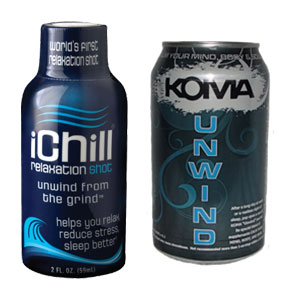 Can relaxation, a good night’s sleep or happiness come from a lightly carbonated, berry-flavored beverage?
Can relaxation, a good night’s sleep or happiness come from a lightly carbonated, berry-flavored beverage?
Amid booming sales of energy drinks spiked with caffeine and other stimulating ingredients, some people are heading to the soda aisle for drinks that promise the opposite effect. With names like Neuro Bliss, Marley’s Mellow Mood (as in Bob), and Just Chill, the products aren’t marketed as medicine, but as a way to relax without turning to more traditional, if sometimes imperfect, measures like taking prescription drugs or having a few beers.
Consumers are warming up to drinks that could fill the chasm between taking medication for anxiety or sleep problems and doing nothing, says Paul Nadel, president of Neuro Drinks, a Santa Monica, Calif.-based company that sells a line of six drinks including Neuro Bliss, Neuro Sleep and Neuro Sonic, an energy drink. He says the “overmedicated culture we live in” has primed consumers for the concept of a relaxation drink.
Small studies show that some of the ingredients in relaxation drinks, like melatonin, valerian root and L-theanine, appear to help fight sleeplessness or to create a sensation of relaxation in isolated situations.
Still, clinicians recommend turning to drugs or supplements as a last resort for sleep and anxiety problems after trying daily exercise, a consistent wake-up time, turning off electronics and darkening rooms in the evening, therapy or other measures.
The ingredients appear reasonably safe for most adults, but users should check with a doctor or research how they might mix with other medications or pre-existing illnesses, says Catherine Ulbricht, co-founder of Natural Standard Research Collaboration, a Somerville, Mass., group that evaluates natural therapies.
She notes that this class of beverages with multiple active ingredients hasn’t been well-studied: “I don’t mean to sound scary, but it’s not water.”
Often the drinks are marketed as dietary supplements, a classification under Food and Drug Administration standards that means at least one ingredient isn’t considered conventional food. The FDA doesn’t review the efficacy, safety or quantity of active ingredients in dietary supplements.
The relaxation drinks come as traditional soda sales continue on an almost decadelong decline and more companies are introducing drinks tailored to niche audiences.
More consumers say they want a drink that feels healthier than soda—hence the raft of new, lower-calorie beverages. Some have only natural ingredients, while other so-called “functional” products claim some benefit like energy, sleep or cold-fighting properties.
Big beverage companies are pitching coconut water, energy drinks and fruit smoothies, but so far haven’t dipped their toe into the relaxation business.
It’s not clear the relaxation drink concept will stick. In 2012 relaxation drinks (which includes sleep drinks) accounted for about $32 million in U.S. wholesale sales, a slight increase from previous years, but a tiny amount compared with the $6 billion generated by U.S. energy drinks the same year, says Gary Hemphill, managing director of research for Beverage Marketing Corp. “Some people say, ‘If I want to relax I’m going to have a martini,” Mr. Hemphill says.
Read More at: http://online.wsj.com/article/SB10001424052702304373104579109283589583074.html

